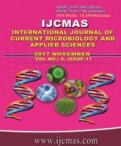


 National Academy of Agricultural Sciences (NAAS)
National Academy of Agricultural Sciences (NAAS)

|
PRINT ISSN : 2319-7692
Online ISSN : 2319-7706 Issues : 12 per year Publisher : Excellent Publishers Email : editorijcmas@gmail.com / submit@ijcmas.com Editor-in-chief: Dr.M.Prakash Index Copernicus ICV 2018: 95.39 NAAS RATING 2020: 5.38 |
In cloning during reconstruction of embryo, the oocyte cytoplast reprograms the DNA of a donor nucleus, changing its status from a somatic state to an embryonic state. This remarkable change is due to the unique combination of reprogramming factors (DNA-associating factors) present in the oocyte. The reprogramming factors in the oocyte are not suitably designed to handle the epigenetic status of the somatic cells which often results in an incomplete transition due to inadequate remodelling of the donor nucleus. Recently various reprogramming enhancers have been used either on the developing cloned embryos or on donor cells which check the epigenetic errors by altering histone acetylation levels and increase the developmental competence of cloned embryos. Trichostatin A (TSA), a histone deacetylase inhibitor (HDACi) holding promise for increasing the developmental competence of cloned embryos produced either by somatic cell nuclear transfer (SCNT) or by hand-made cloning (HMC) technique in different species.
 |
 |
 |
 |
 |